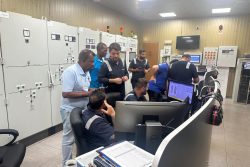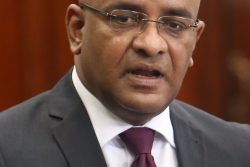Dear Editor,
In the afternoon session of the recently concluded national conference of the Alliance for Change (AFC) the Region Six (East Berbice/Corentyne) delegation moved the following motion from the floor: “This Conference condemns in the strongest, loudest and angriest voice possible the recent obscenity that passed for consultation between our native communities and the government of Guyana. In particular, we condemn the paternalistic… treatment of those members of the Toshaos Council and delegates who were party to the meeting, and refused access to the press by the gate-keepers of the government – an indecent reminder of the more than 500 years of exclusion and marginalization that continue to trail our native peoples.”
The motion was promptly seconded. In the ensuing discussion several speakers added other incidents of the past week where reports of the government’s attempt to quarantine and shadow native peoples from the media were quite visible. Needless to say, the motion was unanimously approved.
It was not, therefore, without some amazement we read in the following morning’s papers ( November 1) a letter from the Press and Publicity Officer of the President’s Office, Mr Kwame McCoy, complaining about Stabroek’s editorial of the previous day ‘Amerindian leaders and freedom of speech.’ Mr McCoy’s letter is breathtaking in its sheer arrogance: “I have no apology, absolutely none…” Wow! Is this authority, or what?
I thought Mr McCoy did have cause to complain about the Sunday Stabroek editorial, especially its reference to our first/native peoples as “Amerindians” – a reminder of Europe’s ‘discovery’ of these parts. But that was not it. In fact, Mr McCoy repeats the insult and is not above calling native peoples “Amerindians” himself.
Substantively, Mr McCoy’s letter seeks to make two points. First, in its view, the Sunday Stabroek editorial has nothing really to complain about since the state media “enjoys the rule of exception.” What is this? Is this a new legal principle that the state now arrogates to itself, or hidden constitutional authority tucked away somewhere in the vast
perogative of executive authority?
Moreover, the letter suggests, “the government cannot depend on the so called independent media” for “national events to be captured in their entirety.” Mr McCoy presumes that “entirety” means the duration of the “official” event, including speeches from high up and the usual questions/discussions that follow. But “entirety” in Mr McCoy’s view also means one and only one version of the ‘official’ event. And isn’t this what the issue is all about? Such an ‘official’ version is open to ‘official’ manipulation since there were no others there to suggest otherwise. We know too much of our own history to give credence to the idea that the ‘official’ version is the best or the only reliable one around – in its “entirety” or otherwise.
In the end the principle, “rule of exception,” seem to have a fuzzy origin and, in fact, may not exist at all. On the contrary, it appears to be a strident and abrasive attempt – “no apology, absolutely none…” to arrogate authority in clear contravention of existing practices – public meetings open to the media! It may, therefore, be in violation of the constitution, as Sunday Stabroek implied in its editorial, and which Mr McCoy appears to have disregarded in his hurry to claim authority.
A dozen constitutional lawyers, here in the Caribbean and the United Kingdom, do not seem to recognize “rule of exception of the media.” In fact, in the view of most of them it would be a dangerous precedent that kick-starts the drive towards state monopoly, if it does not already exist, since it allows the state to invoke the principle wherever and whenever it sees fit – as it has done in this case.
Second, and the real point at issue, according to Mr McCoy, is Stabroek’s “role as part of the agenda of the political opposition… trying to contaminate the minds of Amerindian leaders as a way of undoing the success of the government.” Am I reading correctly? Is this for real? But there is always a silver lining even in the darkest cloud. This maybe the real message that Mr McCoy wanted to convey: “Amerindian Leaders” (sic!) are essentially childlike and must be protected from the contaminating influence of free and open speech. They are to remain wards of the state and it is the latter which will decide what is or is not good for them, including what will or will not “contaminate” the minds of their leaders.
Yours faithfully,
Rishee Thakur





